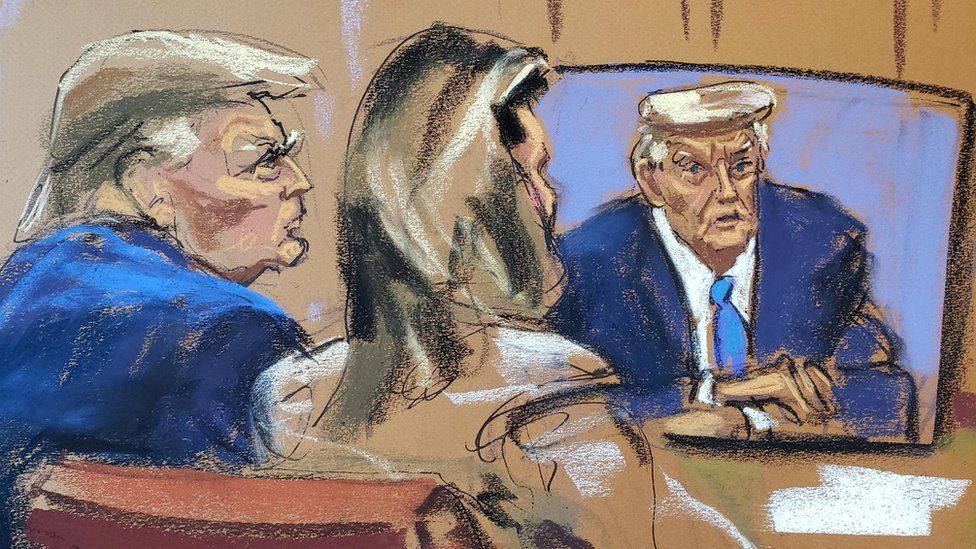
Defiant Trump takes legal risk on stand in New York defamation trial

By Brandon Livesay and Nada Tawfik
Reporting from court in New York
Donald Trump testified on Thursday in the defamation trial brought by writer E Jean Carroll, but his much-anticipated time on the stand was kept brief.
The former president – who has already been found to have defamed Ms Carroll for comments he made about her in 2019 – was under strict rules on what he could say.
But he told the jury that he stood “100%” by a deposition given in 2022 in which he strongly denied her sexual assault allegations and called her a “whack job”.
Other comments he made were struck from the record by the judge for breaching the restrictions, which took significant time to agree before he took the stand.
Mr Trump has been testing the limits of the courts in his various legal cases that have become intertwined with his re-election campaign.
It’s a strategy which keeps his political base invested and tuned in, and gives him considerable press coverage as he looks set to become the Republican presidential nominee.
A related civil trial last year found that he had sexually assaulted Ms Carroll, a magazine columnist, in a New York department store in the 1990s and pay her about $5m in damages. The jury also found him liable for defamation for calling her accusations a lie.
Despite that ruling, he continues to regularly deny the attack in public comments.
This civil trial focuses on separate defamatory comments Mr Trump made about Ms Carroll in 2019 while in the White House, with the jury considering how much Trump must pay in damages.
Closing arguments will take place on Friday and a ruling could swiftly follow.
Haggling over rules for testimony
Mr Trump’s continuing denials of Ms Carroll’s sexual assault allegations – despite what a court already found – are the reason why he was under severe limits on what he could say in his testimony in the New York court on Thursday.
The legal complications meant the judge and lawyers spent much more time arguing about what Mr Trump would be allowed to talk about compared to his four minutes of testimony.
Judge Kaplan said the first trial established the facts and the only issue remaining was how much Mr Trump must pay Ms Carroll, if anything. The Republican frontrunner was told he would not be allowed to deny that he sexually assaulted Ms Carroll.
The strict terms made it impossible for Mr Trump to launch into a monologue or to campaign from the witness stand.
It’s perhaps a lesson learned from one of Mr Trump’s other legal battles. In a New York civil fraud trial earlier this month, Mr Trump was initially told he could not give his closing argument. The judge in that case asked whether Mr Trump would keep it short and stick to the matters of the case.
Mr Trump responded with a six-minute monologue in which he argued he was a victim of political persecution.
The defamation trial on Thursday gave the 77-year-old much less leeway.
Asked if he stood by his deposition, Mr Trump said: “100% yes.”
His lawyer Alina Habba then asked if he denied Ms Carroll’s accusation. “That’s exactly right, yes I did,” he responded.
He went on to say “she said something that I considered a false accusation – totally false”.
But Judge Kaplan quickly cut Mr Trump off and told the jury to ignore that last statement.
Finally, Ms Habba asked if her client had ever instructed anyone to hurt Ms Carroll, to which Mr Trump said: “No, I just wanted to defend myself, my family and frankly, the presidency.” The judge again ordered the latter part stricken from the record.
And with that, the testimony was over. As he left the courtroom Mr Trump was heard saying: “It’s not America. This is not America.”
Earlier in the day, Judge Kaplan warned him to stop interrupting proceedings by “talking loudly”. That included a moment when he was heard muttering under his breath that he had “never met this woman [Ms Carroll]”.
Image source, Reuters
Trump looks on as his lawyer Alina Habba questions former New York TV news anchor Carol Martin
Testifying outside of the limitations outlined by the judge on Thursday could have theoretically caused Mr Trump to face hefty fines or even five years in prison for perjury.
Ronnell Andersen Jones, a professor of law at the University of Utah, told BBC News the case showed the “wide gap” between Mr Trump’s strategies in court and on the campaign trail.
While the former president and his lawyers may want to convince the jury that his comments in the White House did not show “ill will that warrants punitive damages”, that is easier said than done considering his actions.
“This will be a hard row to hoe, given that this same jury is daily receiving new evidence that the defendant, outside the courtroom, continues to spread the lie undeterred,” Ms Jones said.
The defamation trial will resume on Friday at 09:30 ET (14:30 GMT) with closing arguments. It is not yet known if Mr Trump will attend.
Source: https://www.bbc.co.uk/news/world-us-canada-68071744?at_medium=RSS&at_campaign=KARANGA















